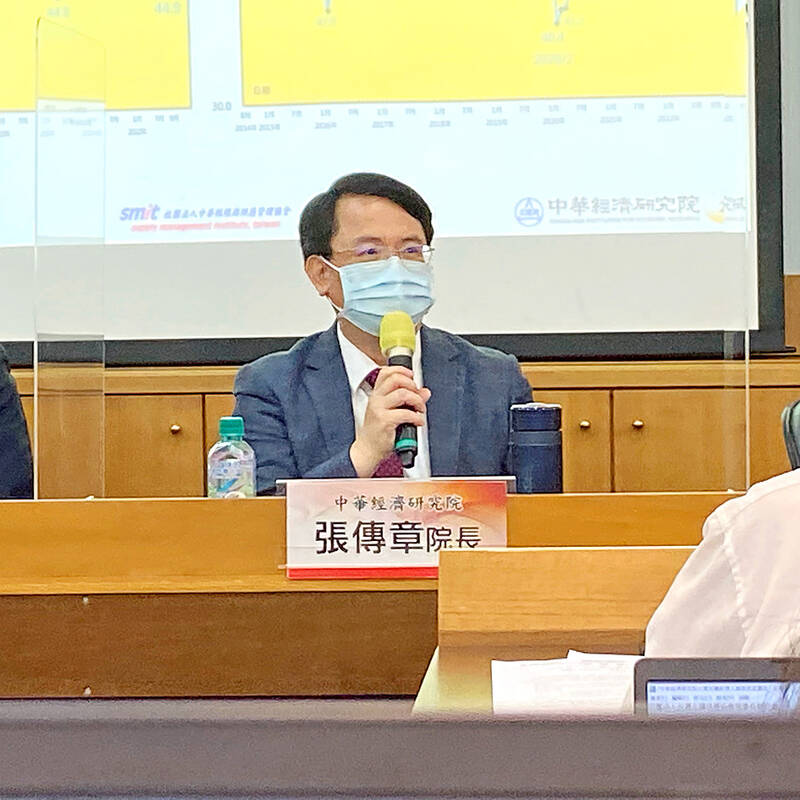The manufacturing purchasing managers’ index (PMI) last month lost another 2.3 points and dropped to 44.9, its lowest level in more than two years, as operating conditions for local manufacturers weakened further and might not recover in the next quarter, the Chung-Hua Institution for Economic Research (CIER, 中華經濟研究院) said yesterday.
The latest PMI data came after new business orders and industrial production declined, in line with tepid demand for technology products, CIER president Chang Chuang-chang (張傳章) said.
The PMI gauges the health of the manufacturing industry, with values of above 50 suggesting expansion and points below the threshold indicating contraction.

Photo: Huang Tzu-hsun, Taipei Times
“Business momentum would remain soft in the near future, and much uncertainty looms over the medium term, depending on how global economic scenes pan out,” Chang said.
Local manufacturers are generally conservative about their business prospects, with the reading on the six-month outlook standing at 28.3, unchanged from one month earlier, the Taipei-based think tank said.
Local firms were most concerned about economic uncertainty, and that risks related to the Ukraine war, global inflation and monetary tightening would not settle any time soon, CIER researcher Chen Shin-hui (陳馨蕙) said.
The reading on clients’ inventory stayed high at 52.4, although down 6.8 points from August, meaning that customers have more inventory than necessary to operate, it said.
At the same time, tight COVID-19 controls in China continue to cloud order visibility and weigh on business for local firms, Chen said.
Some firms expressed hope that Beijing could reverse course on the lockdowns following the 20th National Congress of China’s top leaders on Oct. 16, Chen said.
China and the US account for more than 50 percent of Taiwanese exports.
CIER vice president Wang Jiann-chyuan (王健全) said that local firms should be prepared for disappointing sales of the latest iPhone series in light of unfavorable economic conditions globally.
Taiwan might follow in the steps of South Korea, a major trade rival, which has reported trade deficits for six months straight, Wang said.
The government can help avoid such a scenario by helping industrial sectors to take bolder steps to encourage private consumption.
“Spending is not a sin, but a virtue,” if the nation is to maintain its growth momentum, Wang said.
The non-manufacturing index (NMI) shed 1.6 points to 52.2, above the expansion mark for three consecutive months, as sectors reliant on domestic demand emerge from the COVID-19 pandemic, CIER said.
Most service sectors experienced improvement, even though wholesale operators and financial institutes failed to share the benefit, it said.
Still, the six-month business measure dropped 2.8 points to 41.1, as most service providers are preparing for a business downturn amid poor consumer confidence.
Restaurants, hotels and educational facilities are among businesses holding a positive outlook in anticipation of strict border controls being lifted this month, CIER said.

TRADE WAR: Tariffs should also apply to any goods that pass through the new Beijing-funded port in Chancay, Peru, an adviser to US president-elect Donald Trump said A veteran adviser to US president-elect Donald Trump is proposing that the 60 percent tariffs that Trump vowed to impose on Chinese goods also apply to goods from any country that pass through a new port that Beijing has built in Peru. The duties should apply to goods from China or countries in South America that pass through the new deep-water port Chancay, a town 60km north of Lima, said Mauricio Claver-Carone, an adviser to the Trump transition team who served as senior director for the western hemisphere on the White House National Security Council in his first administration. “Any product going

STRUGGLING BUSINESS: South Korea’s biggest company and semiconductor manufacturer’s buyback fuels concerns that it could be missing out on the AI boom Samsung Electronics Co plans to buy back about 10 trillion won (US$7.2 billion) of its own stock over the next year, putting in motion one of the larger shareholder return programs in its history. South Korea’s biggest company would repurchase the stock in stages over the coming 12 months, it said in a regulatory filing on Friday. As a first step, it would buy back about 3 trillion won of paper starting today up until February next year, all of which it would cancel. The board would deliberate on how best to effect the remaining 7 trillion won of buybacks. The move

NVIDIA PLATFORM: Hon Hai’s Mexican facility is to begin production early next year and a Taiwan site is to enter production next month, Nvidia wrote on its blog Hon Hai Precision Industry Co (鴻海精密), the world’s biggest electronics manufacturer, yesterday said it is expanding production capacity of artificial intelligence (AI) servers based on Nvidia Corp’s Blackwell chips in Taiwan, the US and Mexico to cope with rising demand. Hon Hai’s new AI-enabled factories are to use Nvidia’s Omnivores platform to create 3D digital twins to plan and simulate automated production lines at a factory in Hsinchu, the company said in a statement. Nvidia’s Omnivores platform is for developing industrial AI simulation applications and helps bring facilities online faster. Hon Hai’s Mexican facility is to begin production early next year and the

China’s Huawei Technologies Co (華為) plans to start mass-producing its most advanced artificial intelligence (AI) chip in the first quarter of next year, even as it struggles to make enough chips due to US restrictions, two people familiar with the matter said. The telecoms conglomerate has sent samples of the Ascend 910C — its newest chip, meant to rival those made by US chipmaker Nvidia Corp — to some technology firms and started taking orders, the sources told Reuters. The 910C is being made by top Chinese contract chipmaker Semiconductor Manufacturing International Corp (SMIC, 中芯) on its N+2 process, but a lack